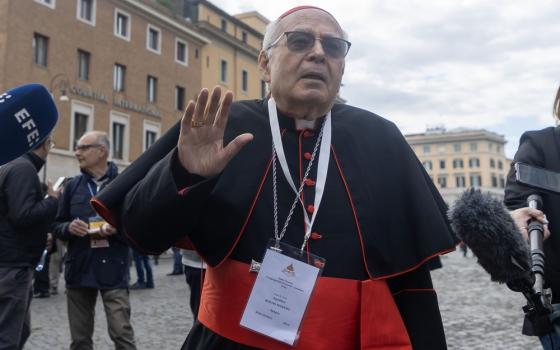Of course, Cardinal Sean O’Malley is not going to attend Boston College’s graduation ceremony and share the stage with – and provide a photo-op to – the Taoiseach of Ireland, Enda Kenny.
Kenny’s government, when faced with a horrible tragedy in the death of Savita Halappanavar, not only failed to stick to the facts – Irish law permitted inducing pregnancy in such cases – it used the tragedy to re-visit Ireland’s abortion laws. As Charles Camosy observed, “[Ireland] is a great example of a developed country which refuses to choose between women and their prenatal children. They are not only on the right side of justice, they are on the right side of history.” The government in Ireland wishes to turn its back on that proud history and make direct abortion licit when the life of the mother is threatened. The proposed law could also require Catholic hospitals to perform direct abortions.
To be clear, this new law does not only allow procedures that have the unintended effect of losing the child. It permits direct abortion, in which one life is chosen over another. The issue is not merely abstract for me. When my mother was pregnant with me, she had intended to go to a public hospital. But, weeks before the due date, the maternity wing at that hospital burned. Back then, at a Catholic hospital, if the doctors had a choice of saving the life of the child or the mother, they saved the child. Conscious of the fact that she had a five year old daughter at home, my mother chose to go to Mt. Sinai hospital where, thankfully, I was born without complications for either of us. I understand my mother’s reasoning. I understand, too, that few choices could be more wrenching. But, I also understand that the direct killing of a child is always wrong, and that if it had come to it, my mother’s understandable choice to preserve her own life, taken for entirely unselfish reasons, would nonetheless have been a wrong choice.
The Kenny government has also recalled its ambassador to the Vatican and missed no opportunity to take a whack at the Catholic Church. Obviously, the reprehensible behavior of many Catholic clergy invited skepticism and hostility, and the attempts to cover-up that behavior by the hierarchy deprived the Church of its historic high esteem in the eyes of the people of Ireland. You did not need the government to achieve this last regrettable outcome. The hierarchs did it all on their own.
But, back to BC. What were they thinking? Here is an Irish Prime Minister engaged in a fierce struggle with the hierarchy of his own country, who could put to good political use a photo of him mugging with an American cardinal of Irish ancestry, indeed the same cardinal who was the apostolic visitor to the Archdiocese of Dublin in the wake of the sex abuse scandal and, as well, one of the eight cardinals appointed to Pope Francis’s new commission to help govern the universal Church. The damage to the cause of the Church in Ireland was foreseeable but, sadly, no one in the administration at BC saw it. Part of belonging to a universal Church is considering how an action will affect other Catholics in other parts of the world. Did they not think to consult Cardinal O’Malley in advance, a man who could have explained the difficulties if those difficulties were opaque?
The situation is different from that which faced Notre Dame in 2009 when it invited President Obama to speak at their graduation ceremony. He was the newly elected president of the United States, and the first African-American elected to the post. Commemorating his election was as much about honoring the nation as it was about the man himself. Additionally, Obama had spoken frequently about seeking common ground on the issue of abortion by pursuing a strategy to reduce the incidence of abortion. He was engaged in an effort to provide universal health insurance, a long time goal of the Church in the U.S., and to wind down the war in Iraq, an obvious goal for the universal Church. Yes, his support for liberal abortion laws was, and is, repugnant. But, in context, it was not the whole story. The same goes for the appearance of Archbishop Desmond Tutu at Gonzaga University: Tutu played a key role in ending one of the great injustices of our time in a peaceful way and affecting a reconciliation in South African society that almost no one believed possible. Against such a backdrop, who cares if he supports same sex marriage? Conversely, can anyone name any accomplishment of the Taoiseach that BC perceived it so important to have him on their stage? I am familiar with the cultural Irishness of Chestnut Hill, but if playing to that cultural sensibility was the goal, why not get the Singing Priests?
Cardinal O’Malley’s statement announcing his decision not to attend graduation was very different from some of the statements issued by bishops in 2009 during the Notre Dame imbroglio. “I am sure that the invitation was made in good faith, long before it came to the attention of the leadership of Boston College that Mr. Kenny is aggressively promoting abortion legislation,” he stated. It is amazing how far the presumption of good faith goes to keep an issue, or in this case a mistake, in perspective.
I have addressed our Catholic penchant for “graduation wars” before. I remain unclear why the choice of a graduation speaker is such a big deal in the first place. I am quite clear that I could have put the money Boston College will spend bringing the Taoiseach here and arranging for appropriate hospitality and, perhaps, an honorarium, to better use. And, I do not like the witch hunt theatrics that often attend these graduation wars. Still, it says something good about our faith that it still matters enough that we fight about it. I think it was a mistake for the USCCB to single out abortion supporters when deciding who can, and cannot, warrant an award or honor from a Catholic institution. When discussing why he does not distribute communion at certain Masses, Pope Francis explained that he did not want to give a photo op to plutocrats who treat the poor unjustly. The USCCB should reflect long on the new pope’s choice of an example.
So, Boston College will have its ceremony. The cardinal will not be there. The Taoiseach will not get his photo op. It is unclear what will happen in Ireland, but if the government succeeds in passing this new law, a law that is as well-intentioned as my mother’s decision to go to Mt. Sinai Hospital, but a mistaken law nonetheless, no one can charge Cardinal O’Malley with giving an assist to the mistaken effort. Good for him.






